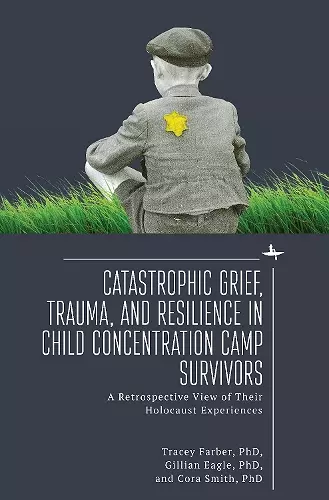Catastrophic Grief, Trauma, and Resilience in Child Concentration Camp Survivors
A Retrospective View of Their Holocaust Experiences
Cora Smith author Gillian Eagle author Tracey Rori Farber author Cora Smith editor Gillian Eagle editor Tracey Rori Farber editor
Format:Hardback
Publisher:Academic Studies Press
Published:6th Jul '23
Should be back in stock very soon

This volume comprehensively explores the life trajectories of nine child/adolescent Holocaust concentration camp survivors as recollected when the subjects were elders. Based on extensive face to face interview material, enduring psychological and symptomatic effects were evident. Survivors retained vivid recollections of the horror of internment and expressed ongoing grief for the multiple losses they had experienced. Unresolved grief contributed to a sense of existential loneliness, particularly prominent in their late life reflections. Despite indications of resilience and life productivity, a ‘Trauma Trilogy’ of inter-linked catastrophic grief, anger, and survivor guilt contributed to a sense of pain and struggle in negotiating Erikson’s final life task of Integrity versus Despair.
“This is a well-written, organized, and accessible book and an important addition to the literature on the long-term impacts of severe childhood trauma in the lives of Holocaust survivors… The authors discuss the trauma trilogy of grief, anger, and survivor guilt; how revisited memories can retraumatize survivors as they come to belated understandings of childhood losses; the mediating impact of early attachment on resiliency; and the catastrophic grief and lack of closure that is ubiquitous among all interviewees.”
— M. D. Lagerwey, emeritus, Western Michigan University, CHOICE
“A book, raw in the visceral descriptions of the effects of the Holocaust provided by ageing child survivors as they painfully and courageously re-visit their experiences in the camps, the death marches and beyond. A book of inspiration in the warmth and compassion of the interviewer who listened and cared and whose personal resonances with the survivors shone through.
A hugely informative book in all authors’ scholarly research on complex trauma, complicated bereavement, ageing, resilience and existential loneliness. A remarkable, must read book in contemporary times not only for its collection of rare testimonies of ageing survivors of the holocaust but for its insights into the very long term but individual effects of massive collective trauma, which continue to dog the twenty first century. It is a testimony to despair and hope, trauma and resilience, and a must read for those who at least wish to try to understand.”
— Gillian Straker, Clinical Professor, University Of Sydney; Visiting Research Professor, University Witwatersrand
"This book captures the voices of some of the last living survivors of the Holocaust. These in-depth interviews provide valuable testimony to how the catastrophic losses and trauma suffered by children and youth in the context of a genocide shaped their life trajectories, and how these early experiences impact their engagement with the final developmental challenges of the late years in life. Moreover, Tracey Farber was one of the few practitioners who braved doing home visits during the Covid-19 pandemic. Her book brings a unique contribution since the interviews took place during a historical time that changed life for all, and exposed aging child survivors of the Holocaust to the most severe pandemic of the last 100 years, forcing them to endure isolation, loneliness and disrupted care, once again. Farber’s gentle and compassionate relationships with the survivors are an inspiration to all who know or work with trauma survivors.”
— Irit Felsen, PhD, Clinical Psychologist, Co-Chair of the Trauma Working Group at the NGO on Mental Health in Consultative Relationship to the United Nations
“This important book adds many layers and considerable clarity to our understanding of child concentration camp Holocaust survivors’ experiences as they age. South Africa was always on the margins of the history of the Second World War and the Holocaust; only about 350 Holocaust survivors settled in the country after the war, many of whom were children and adolescents who were not interviewed about their experiences until the 1990s. It is seldom that a group of survivors trust and feel so comfortable with a researcher such as these nine survivors have been with Tracey Farber. They have known her for years and have benefitted from her visible care and generosity of spirit. Through her research, she does not only study the topic but also makes important steps to make sure they are cared for through the establishment of Holocaust survivors services in South Africa. This book is a testament to the many years of dedication and real care she has displayed, of which we are all grateful beneficiaries. I encourage all to read this important book, which includes not only the cases of these survivors and analysis of their experiences, but also excellent suggested steps forward that can be implemented widely.”
— Tali Nates, Founder and Director, Johannesburg Holocaust & Genocide Centre
“A must-read for those interested in a rich combination of unique perspectives on theories of childhood development and trauma, including the impact on aging for those who were children during the Holocaust. The Survivor narratives are gripping and haunting, and command the reader to pause in honor of their testimonies. Be prepared to be inspired by their resilience. This book contributes to a deeper understanding of the experiences of grief and hope among those who survived the atrocities of the Holocaust as children.”
— Jenni Frumer, Ph.D., LCSW, MSEd; Director, NOW for Holocaust Survivors Initiative/MorseLife Health System USA
ISBN: 9781644696347
Dimensions: 155mm x 233mm x 20mm
Weight: 653g
400 pages